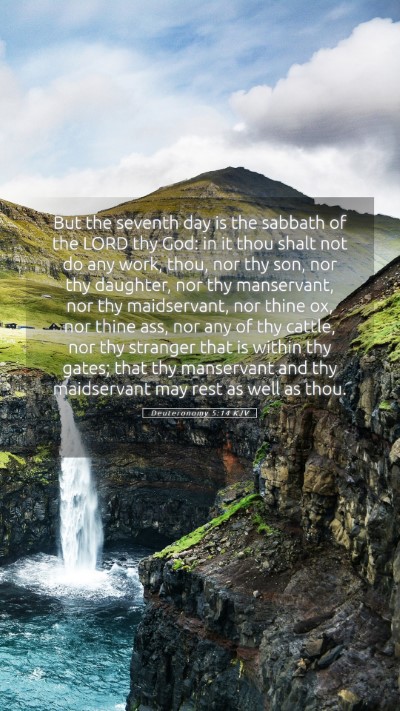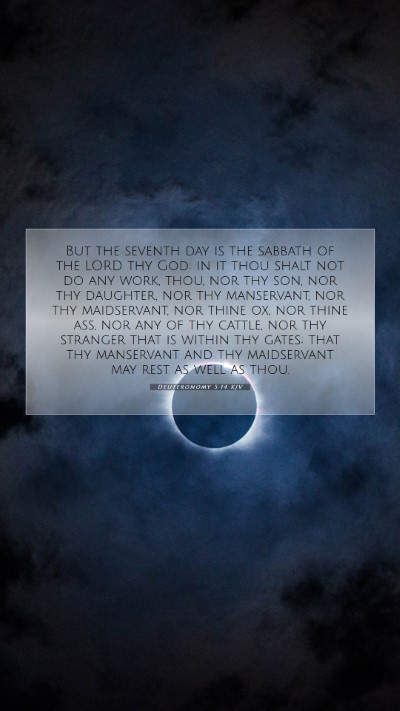Bible Verse Meaning: Deuteronomy 5:14
Verse Text (Deuteronomy 5:14): "But the seventh day is the Sabbath of the LORD thy God: in it thou shalt not do any work, thou, nor thy son, nor thy daughter, thy manservant, nor thy maidservant, nor thine ox, nor thine ass, nor any of thy cattle, nor thy stranger that is within thy gates; that thy manservant and thy maidservant may rest as well as thou."
Overview of the Verse
This verse highlights the importance of the Sabbath, establishing it as a day of rest ordained by God. It emphasizes the cessation of all work, not just for oneself but also for family, servants, and even animals, thereby promoting rest and recovery. The Sabbath stands as a crucial element of covenantal living within the community of Israel.
Insights from Public Domain Commentaries
Analyzing various commentaries, we can derive several key interpretations and implications of this verse:
Matthew Henry's Commentary
- Significance of Rest: Matthew Henry emphasizes that the Sabbath provides not only physical rest but also spiritual restoration. It is a time to reflect on God's creation and His covenant.
- Social Justice: He notes that the command to allow servants and animals to rest highlights social equity, insisting that all within a household share in the rest, promoting a culture of care and community.
- Divine Command: Henry points out the divine authority behind the Sabbath command. It is rooted in God's creation pattern, where He rested on the seventh day, which sets a precedent for His people to follow.
Albert Barnes' Notes on the Bible
- Covenantal Duty: Barnes underscores that observing the Sabbath is part of the Israelites' covenant obligations. This day symbolizes their unique relationship with God.
- Universal Application: He insists that the Sabbath is not just for the Israelites but serves a universal purpose in God’s order of creation.
- Practical Implications: Barnes addresses the implications of this command in terms of societal practices, suggesting that resting is vital to physical and mental health.
Adam Clarke's Commentary
- Theological Reflection: Adam Clarke interprets the Sabbath as not merely a cessation of work but also a time for worship and acknowledging God’s sovereignty.
- Restoring Relationships: He indicates that this day promotes relationships, both with God and with fellow humans, as it encourages community gatherings and worship.
- Symbolism of the Sabbath: Clarke analyzes the Sabbath as a foreshadowing of spiritual rest found in Christ, connecting it to New Testament teachings.
Theological Implications
In summary, this verse carries profound theological implications regarding rest. It reminds believers of God’s provisions for rest in their busy lives and encourages them to trust in His providence. The Sabbath thus becomes a weekly opportunity to reflect, recharge, and rejoice in God's work and creations.
Bible Verse Applications
This verse can be applied in various contexts today, notable points include:
- Personal Reflection: Individuals are encouraged to set aside time each week for rest and spiritual renewal.
- Family and Community: Families can engage in Sabbath activities that promote spiritual growth together.
- Work-Life Balance: The verse calls for modern society to rethink labor and productivity, advocating for times of rest amidst hectic schedules.
Cross References
This verse resonates with several other scriptural passages, including:
- Exodus 20:8-11 - The establishment of the Sabbath commandment
- Mark 2:27 - Jesus’ teaching on the Sabbath's purpose
- Hebrews 4:9-11 - A spiritual perspective on Sabbath rest
Conclusion
Deuteronomy 5:14 is rich with meaning, urging individuals to contemplate their relationship with God through the practice of Sabbath. The teachings of this verse invite believers into deeper Bible study and exploration of God’s word, framing the Sabbath as an essential aspect of faith and community living.


